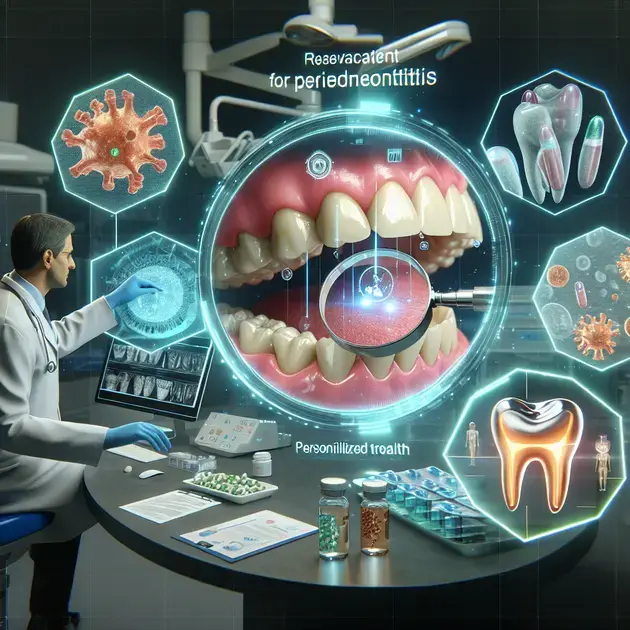Managing periodontitis with effective medication is crucial for maintaining good oral health. This condition, which is a severe form of gum disease, can lead to tooth loss if left untreated. Fortunately, recent advancements in medication have provided more effective options for managing periodontitis.
By using the right medication as part of a comprehensive treatment plan, individuals can effectively control the progression of periodontitis and reduce the risk of complications. It is important to work closely with a dental professional to determine the most suitable medication and treatment approach for each individual case.

Effective Medication for Managing Periodontitis
Periodontitis is a serious gum infection that damages the soft tissue and destroys the bone that supports your teeth. To effectively manage periodontitis, medication can play a crucial role in controlling the infection and reducing symptoms. Here is a guide on how to choose the right medication for managing periodontitis:
1. Consult with a Dental Professional:
Before starting any medication for periodontitis, it is essential to consult with a dental professional. They will evaluate the severity of your condition and recommend the most suitable medication based on your specific needs.
2. Prescription Medications:
Your dentist may prescribe antibiotics to help control the infection and reduce inflammation. Common antibiotics for periodontitis include doxycycline, minocycline, and metronidazole. These medications are usually taken for a specific period as directed by your dentist.
3. Over-the-Counter Options:
In addition to prescription medications, there are also over-the-counter options available to manage periodontitis symptoms. Antiseptic mouthwashes containing chlorhexidine or essential oils can help reduce bacteria in the mouth and promote gum healing.
4. Pain Management:
If you experience pain or discomfort due to periodontitis, over-the-counter pain relievers such as ibuprofen or acetaminophen can help alleviate the symptoms. It is important to follow the recommended dosage and consult with your dentist if the pain persists.
5. Lifestyle Changes:
Along with medication, lifestyle changes such as maintaining good oral hygiene practices, quitting smoking, and eating a balanced diet can also contribute to better management of periodontitis. Collaborate with your dental professional to create a comprehensive treatment plan that includes medication and lifestyle modifications for optimal results.
Advancements in Medication for Periodontitis Treatment
With advancements in the field of dentistry, new medications and treatment options for periodontitis continue to emerge, offering more effective ways to manage the condition. Here are some recent advancements in medication for periodontitis treatment:
1. Targeted Drug Delivery Systems:
Advances in technology have led to the development of targeted drug delivery systems that allow for precise administration of medication directly to the affected areas in the gums. This targeted approach ensures maximum effectiveness and minimal side effects.
2. Bioactive Compounds:
Researchers are exploring the potential of bioactive compounds, such as probiotics and antimicrobial peptides, in treating periodontitis. These natural substances can help promote gum health and inhibit the growth of harmful bacteria that contribute to the infection.
3. Regenerative Medicine Therapies:
Regenerative medicine therapies, such as growth factors and stem cell therapy, show promising results in promoting tissue regeneration and bone growth in the treatment of periodontitis. These innovative approaches aim to restore the damaged structures in the gums and bone, leading to improved oral health.
4. Personalized Medicine:
Personalized medicine is gaining traction in periodontitis treatment, where genetic testing and individualized treatment plans are tailored to each patient’s unique genetic makeup and oral health profile. This personalized approach ensures targeted and effective medication management based on specific genetic factors.
5. Telemedicine Platforms:
Telemedicine platforms are becoming increasingly popular in connecting patients with dental professionals for remote consultations and medication management. Apps like Teledentistry and Livecare offer convenient ways to access expert advice and prescriptions for periodontitis treatment from the comfort of your home.
Collaborating with Dental Professionals for Medication Management
Effective medication management for periodontitis requires collaboration between patients and dental professionals to ensure the best outcomes. Here are some steps to collaborate with dental professionals for medication management:
1. Regular Dental Visits:
Schedule regular dental visits with your dentist or periodontist to monitor the progress of your treatment and adjust medications as needed. These check-ups allow for timely intervention and adjustments to ensure the effectiveness of the medication.
2. Open Communication:
Communicate openly with your dental professional about any concerns or side effects you may experience while taking medication for periodontitis. Your dentist can provide guidance on managing side effects and recommend alternative options if necessary.
3. Follow Treatment Plans:
It is crucial to follow the prescribed treatment plan and take medication as directed by your dental professional. Consistent adherence to the medication regimen will increase the likelihood of successful management of periodontitis and prevent complications.
4. Track Progress:
Keep track of your symptoms and progress throughout the medication management process. Monitoring changes in your oral health and discussing them with your dental professional can help optimize the treatment plan for better outcomes.
5. Seek Second Opinions:
If you are unsure about the medication management plan or seek additional perspectives, don’t hesitate to seek second opinions from other dental professionals. Gathering different insights can help you make informed decisions about your periodontitis treatment.

Advancements in Periodontitis Medication Management
When it comes to managing periodontitis, advancements in medication have played a crucial role in improving treatment outcomes. One of the key advancements is the development of antibiotic therapies specifically targeted towards the bacteria that cause periodontal disease. These antibiotics are often prescribed in conjunction with traditional periodontal treatments, such as scaling and root planing, to provide comprehensive care.
Another important advancement in medication management for periodontitis is the use of local antimicrobials. These antimicrobial agents are applied directly to the affected areas, allowing for targeted treatment and reduced systemic side effects. They can be particularly effective in cases where traditional antibiotics may not be suitable or effective.
In addition to antibiotics and antimicrobials, researchers are also exploring the use of host modulation therapy in the management of periodontitis. This approach focuses on modulating the host response to bacterial infection, thereby reducing inflammation and tissue destruction. By targeting the body’s immune response, host modulation therapy shows promise in improving periodontal health.
Overall, the advancements in periodontitis medication management are paving the way for more personalized and effective treatment strategies. By incorporating these innovative approaches into traditional periodontal care, healthcare providers can better address the underlying causes of the disease and improve patient outcomes.
Evolving Approaches to Treating Periodontitis with Medication
As our understanding of periodontitis continues to evolve, so too do our approaches to treating the disease with medication. One of the emerging trends in periodontitis medication management is the use of probiotics to promote a healthy oral microbiome. By introducing beneficial bacteria into the mouth, probiotics can help restore balance and combat the growth of harmful bacteria.
Another evolving approach is the use of novel drug delivery systems, such as gels, films, or mouth rinses, to enhance the effectiveness of medication in treating periodontitis. These targeted delivery methods ensure that the medication reaches the affected areas directly, maximizing its therapeutic impact while minimizing side effects.
Furthermore, the integration of natural remedies and alternative therapies into periodontitis treatment plans is gaining traction. From herbal extracts to essential oils with antimicrobial properties, these natural options offer patients a holistic approach to managing their periodontal health.
By embracing these evolving approaches to treating periodontitis with medication, healthcare providers can offer patients more diverse and tailored treatment options. This comprehensive approach not only addresses the symptoms of the disease but also promotes overall oral health and well-being.
Enhancing Periodontitis Treatment Through Medication Strategies
Enhancing periodontitis treatment through medication strategies involves a multi-faceted approach that targets both the symptoms and underlying causes of the disease. One key strategy is the incorporation of anti-inflammatory medications to reduce gum inflammation and promote healing. These medications can help manage pain and swelling associated with periodontitis, improving patient comfort during treatment.
Additionally, the use of combination therapy, which involves the use of multiple medications with different mechanisms of action, has shown promise in enhancing the efficacy of periodontitis treatment. By targeting bacteria from multiple angles, combination therapy can help reduce the risk of antibiotic resistance and improve treatment outcomes.
Another aspect of enhancing periodontitis treatment through medication strategies is the emphasis on patient education and compliance. Healthcare providers play a crucial role in educating patients about the importance of medication adherence and proper oral hygiene practices to ensure the success of their treatment plan.
Overall, by combining anti-inflammatory medications, utilizing combination therapy, and prioritizing patient education, healthcare providers can enhance the effectiveness of periodontitis treatment through medication strategies. This comprehensive approach aims to not only manage the symptoms of the disease but also address the root causes for long-term oral health benefits.
Conclusion
In conclusion, the advancements in periodontitis medication management have revolutionized the way we approach and treat this prevalent oral disease. The development of targeted antibiotic therapies and local antimicrobials has significantly improved treatment outcomes by addressing the specific bacteria responsible for periodontal disease, while minimizing systemic side effects. Moreover, the exploration of host modulation therapy showcases a promising avenue for reducing inflammation and enhancing periodontal health by targeting the body’s immune response.
With evolving approaches to treating periodontitis through medication, such as the use of probiotics to restore oral microbiome balance and novel drug delivery systems for enhanced efficacy, healthcare providers can offer patients more personalized and diverse treatment options. The integration of natural remedies and alternative therapies further highlights the shift towards holistic periodontitis management, emphasizing overall oral health and well-being.
Enhancing periodontitis treatment through medication strategies involves a comprehensive approach that combines anti-inflammatory medications, combination therapy, and patient education. By targeting both symptoms and underlying causes of the disease, healthcare providers can improve treatment efficacy and long-term oral health benefits. This multifaceted strategy not only manages pain and inflammation associated with periodontitis but also aims to address the root causes, paving the way for more effective and tailored treatment plans.
.



